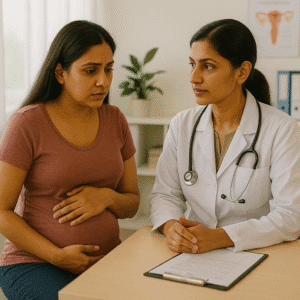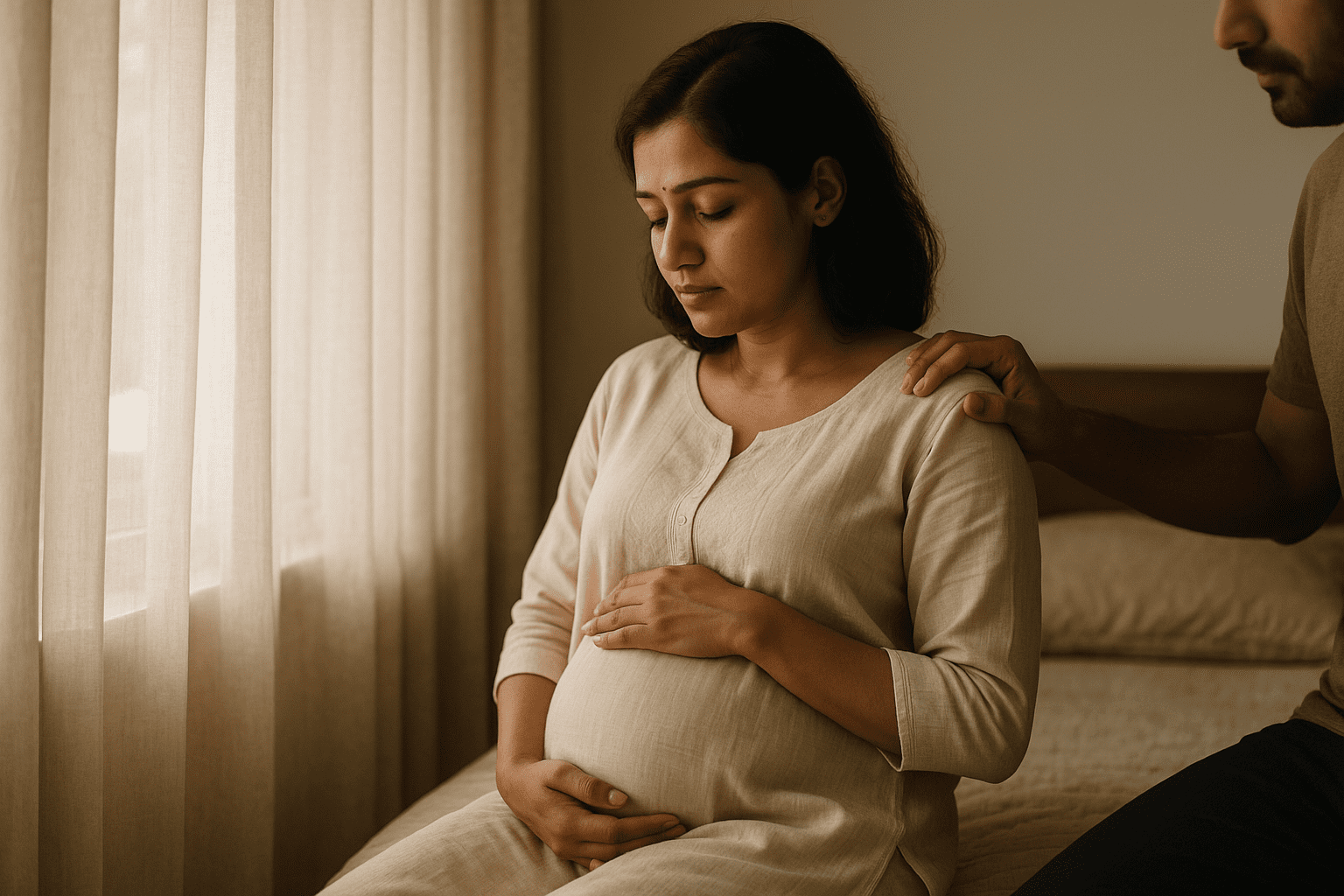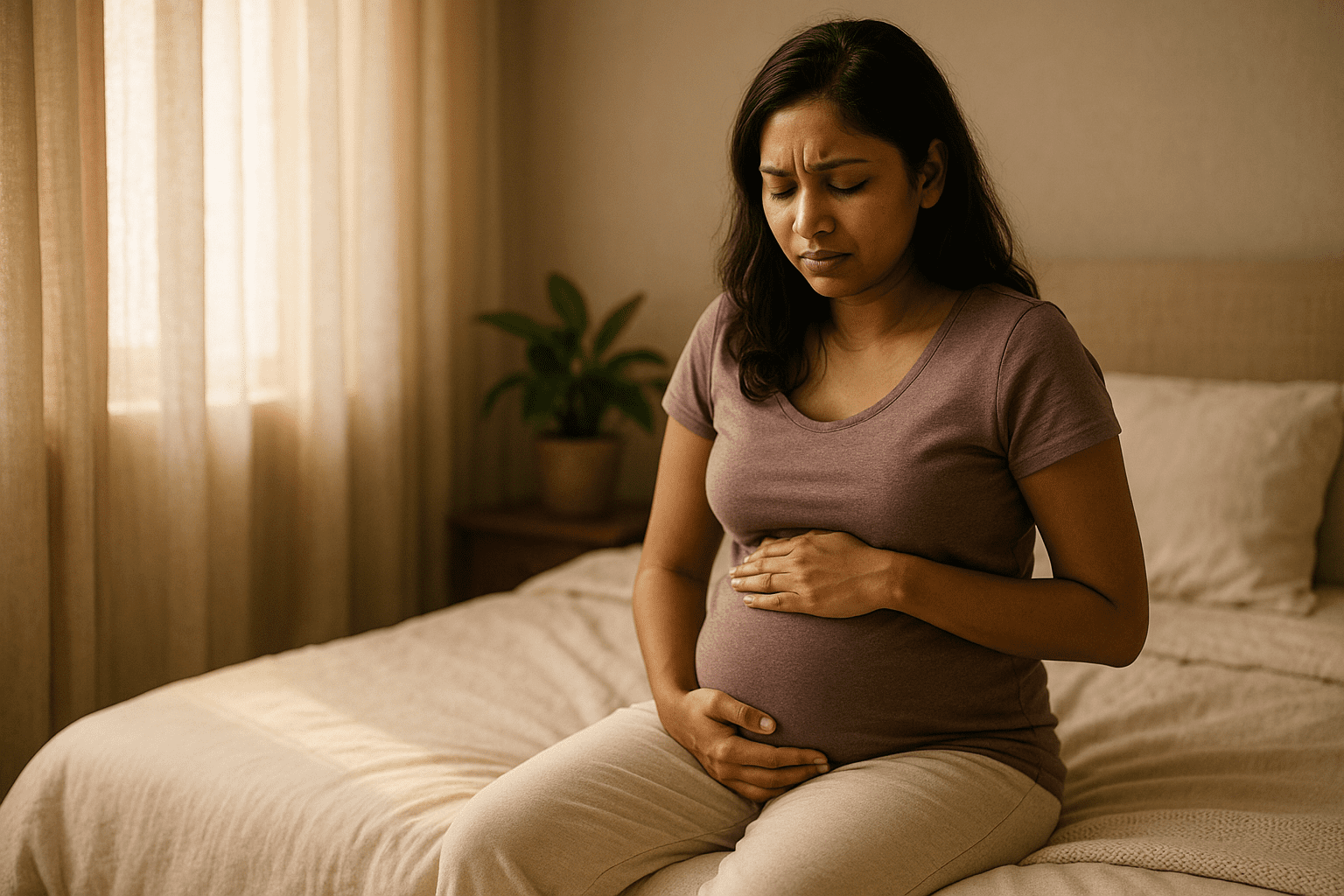Pregnancy spotting is one of those things that can either be nothing or something very serious. And it’s often the first thing a woman notices before she even confirms her pregnancy.
In my clinic, when a woman walks in holding a pregnancy test in one hand and worry in the other, nine times out of ten she starts with the same question: “Is pregnancy spotting normal?”
The short answer? Sometimes. The longer, more honest answer? It depends on when, how much, and what the spotting looks like.
As a gynecologist and a mother of two, I’ve had countless women ask me about spotting during pregnancy. I’ve also been in their shoes. During my first pregnancy with Shriya, I remember spotting faint brown discharge during the sixth week and spiraling into fear. Turns out it was harmless. But I still got it checked. Because when you’re pregnant, you don’t take chances.
Spotting with cramps that don’t go away
Pregnancy spotting with cramps? That combo can mean trouble. Mild cramping is common, but if it sticks around or worsens, especially on one side, it could point to an ectopic pregnancy. I had a young patient once who brushed it off as “regular stretching.” By the time she came in, she needed emergency surgery.
Bright red bleeding
This one’s hard to miss. Light pink or brown spotting might be fine. But bright red bleeding, especially if it soaks a pad, can be an early sign of miscarriage or issues like placental abruption. This is one type of pregnancy spotting that demands immediate attention.
Spotting after intimacy
Sex during pregnancy is generally safe. But sometimes, increased blood flow makes the cervix extra sensitive. If you notice pregnancy spotting after sex, it might just be cervical irritation. Still, if it happens often or gets heavier, speak to your doctor.
Brown spotting with foul smell
Brown spotting might just be old blood. But if it smells odd or is paired with discomfort, itching, or fever, it could signal infection. And infections during pregnancy aren’t something to delay treatment for!
Spotting with dizziness or fainting
This combination should ring all the alarm bells. If you’re having pregnancy spotting along with dizziness, shoulder pain, or fainting episodes, it could indicate an ectopic pregnancy that’s rupturing. Go to the emergency room, stat.
Spotting in second or third trimester
First trimester spotting is relatively common. But any pregnancy spotting after 12 weeks should be considered more carefully. It might relate to placenta previa, preterm labor, or other complications. Always call your OB in such cases.
Repeated spotting episodes
A one-off light spot? Maybe okay. But if you notice pregnancy spotting coming and going, or it starts becoming a pattern, let your doctor investigate. It could be due to a cervical polyp, low-lying placenta, or even hormonal fluctuations.
Quick Reference Table
| Type of Spotting | What It Might Indicate | Should You Worry? |
|---|---|---|
| Light pink, no pain | Implantation or hormonal changes | Usually not |
| Bright red, heavy | Miscarriage or placental issues | Yes, urgent |
| Brown with odor | Possible infection | Yes, see your doctor |
| After sex | Cervical sensitivity | Monitor, check if recurrent |
| With cramps/dizziness | Ectopic pregnancy | Medical emergency |
Additional Advice
If you’re googling what does pregnancy spotting look like while staring at your liner and feeling confused, breathe. Awareness is good. But don’t self-diagnose everything.

Remember, pregnancy spotting is common. But that doesn’t mean you ignore it. Your body whispers before it screams. Listen to the whispers.
Also, many women find that gentle movement like prenatal yoga helps reduce anxiety and build connection with the body. I often recommend this Prenatal Yoga blog to expecting moms who ask how to stay calm and active.
One more thing, if you’re worried about spotting vs period confusion, especially early on, you’re not alone. Spotting tends to be lighter, spottier (pun intended), and shorter. But when in doubt, always check it out.
For medical details on bleeding during pregnancy, here’s a reliable read from the Mayo Clinic.
Final word
Pregnancy spotting doesn’t mean you’re losing the pregnancy. But it does mean your body is trying to say something. Pay attention. You’re not being dramatic. You’re being responsible.
When I was pregnant with Sreyansh, I spotted at week 10 and immediately panicked. I was in the middle of a consultation, and I remember whispering to the nurse to call my husband. Everything turned out fine. But I have no regrets about taking it seriously.
Moms-to-be, your intuition matters. Don’t ignore it.
Take care. And trust yourself.
FAQs about Pregnancy Spotting
1. Is pregnancy spotting always a sign of miscarriage?
No, not always. Spotting can happen for many reasons, including implantation or hormonal changes. However, heavy or recurrent bleeding should be evaluated by a doctor.
2. How can I tell if it’s pregnancy spotting vs a period?
Pregnancy spotting is usually lighter in flow, shorter in duration, and not accompanied by usual period cramps. But a pregnancy test and a visit to your OB are the best way to be sure.
3. Can stress cause pregnancy spotting?
Indirectly, yes. Severe stress can affect hormone levels, which might contribute to spotting. But it’s best to rule out medical causes first.
4. Is brown spotting in early pregnancy normal?
It can be. Brown discharge is often old blood. If it’s not smelly or accompanied by pain, it may not be serious. Still, mention it during your check-up.
5. Should I stop exercising if I see spotting?
Pause and rest. While gentle activity like prenatal yoga is often fine, any spotting should prompt a conversation with your doctor before continuing workouts.
Disclaimer: This article is meant to inform and support. As a gynecologist, my aim is to provide awareness, not diagnosis or prescriptions. Always consult your personal healthcare provider for medical concerns.

Meet Dr. Sonia Iyer — a seasoned gynecologist, mom of two, and trusted voice for women navigating the beautiful chaos of pregnancy and early motherhood. With over 11 years of clinical experience and a deep understanding of real-life parenting, she brings clear, compassionate, and expert-backed advice to every blog she writes.



